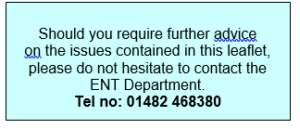- Reference Number: HEY-763/2023
- Departments: ENT, Speech and Language
- Last Updated: 28 April 2023
Introduction
This leaflet has been produced to give you general information about transoral laser resection. Most of your questions should be answered by this advice leaflet. It is not intended to replace the discussion between you and your doctor, but may act as a starting point for discussion. If after reading it you have any concerns or require further explanation, please discuss this with a member of the healthcare team who has been caring for you.
What is Trans-Oral Laser Resection?
Transoral laser resection is a procedure used by a skilled surgeon to resect a small tumour or growth in your voice box (larynx). A highly specialized carbon dioxide laser beam is used. This limits damage to normal structures around the tumour such as nerves, blood vessels and muscles which are important for speech and swallowing. This procedure is performed through the mouth and throat and does not leave a visible scar.
Why do I need Transoral Laser Resection?
You have experienced symptoms that have affected your voice and/or swallowing and you have undergone a number of investigations. You have been diagnosed with a small tumour in your voice box. Following discussion with your doctor, trans-oral laser resection has been recommended as a treatment intervention to remove your tumour.
Can there be any complications or risks?
Any complications or risks will be discussed with you by the doctor, as part of the procedure for informed consent.
How do I prepare for Trans-Oral Laser Resection?
Please read the information leaflet. Share the information it contains with your partner and family (if you wish) so that they can be of help and support. There may be information they need to know, especially if they are taking care of you following this procedure. You will need to attend an appointment at the Pre-Assessment Clinic prior to your hospital admission. You will be given information about your hospital stay.
What will happen?
You will generally be admitted to the ward on the day of your procedure. The procedure will take place in theatre under a general anaesthetic. You will be offered appropriate pain relief post-operatively.
What happens afterwards?
You may be expected to stay on the ward for up to 24 hours post-operatively. Your results will be available at your next outpatient appointment. You may require a further biopsy in 6-8 weeks to check that the treatment has been successful.
You are advised to:
- Rest your voice completely for 4-7 days and then begin to use it gently. Your voice may still be very hoarse at this stage.
- Do not strain your voice by whispering, shouting, singing, raising or forcing it in any way. Speak quietly or use gestures or writing if necessary.
- Moisten your throat by using steam inhalation once or twice daily.
- Advise your healthcare team of any uncontrolled pain or an inability to eat and/or drink.
- Some change in your voice quality is expected after laser surgery and the outcome is dependent on the level of resection required. You may find that voice therapy from a Speech and Language Therapist may help to optimise your voice and to reduce unnecessary strain.
- The Speech and Language Therapist can provide written information on voice rest/conservation and how to look after your voice.
- Regular Consultant review appointments are arranged in the first year post-treatment.
This leaflet was produced by the ENT and Speech & Language Therapy Departments, Hull University Teaching Hospitals NHS Trust and will be reviewed in April 2026.
General Advice and Consent
Most of your questions should have been answered by this leaflet, but remember that this is only a starting point for discussion with the healthcare team.
Consent to treatment
Before any doctor, nurse or therapist examines or treats you, they must seek your consent or permission. In order to make a decision, you need to have information from health professionals about the treatment or investigation which is being offered to you. You should always ask them more questions if you do not understand or if you want more information.
The information you receive should be about your condition, the alternatives available to you, and whether it carries risks as well as the benefits. What is important is that your consent is genuine or valid. That means:
- you must be able to give your consent
- you must be given enough information to enable you to make a decision
- you must be acting under your own free will and not under the strong influence of another person
Information about you
We collect and use your information to provide you with care and treatment. As part of your care, information about you will be shared between members of a healthcare team, some of whom you may not meet. Your information may also be used to help train staff, to check the quality of our care, to manage and plan the health service, and to help with research. Wherever possible we use anonymous data.
We may pass on relevant information to other health organisations that provide you with care. All information is treated as strictly confidential and is not given to anyone who does not need it. If you have any concerns please ask your doctor, or the person caring for you.
Under the General Data Protection Regulation and the Data Protection Act 2018 we are responsible for maintaining the confidentiality of any information we hold about you. For further information visit the following page: Confidential Information about You.
If you or your carer needs information about your health and wellbeing and about your care and treatment in a different format, such as large print, braille or audio, due to disability, impairment or sensory loss, please advise a member of staff and this can be arranged.


